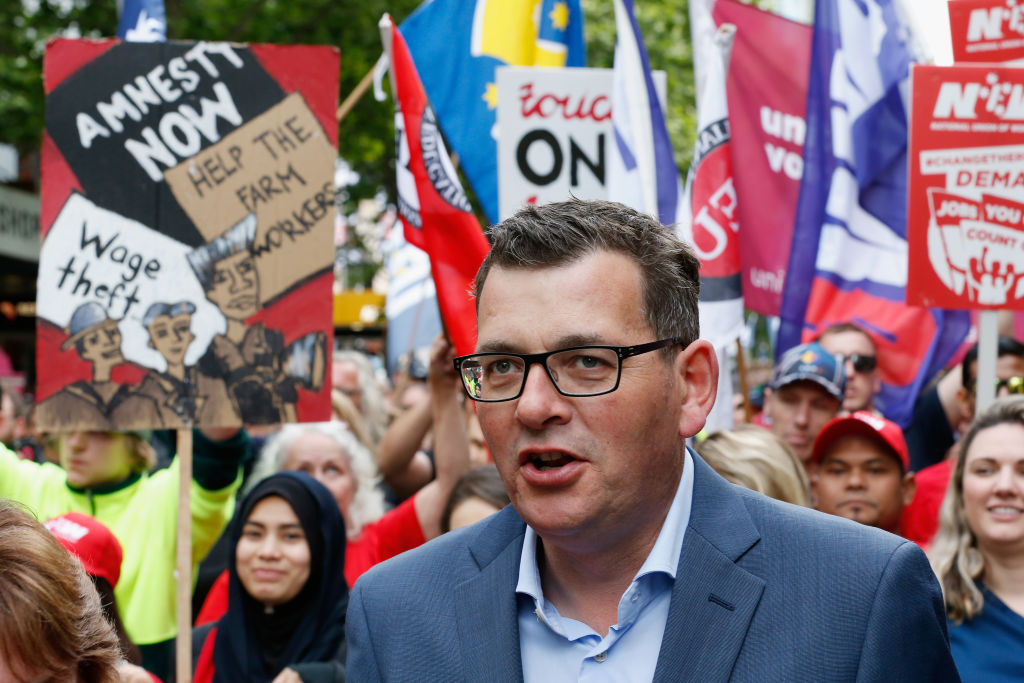
Business & Economics
Tackling underpayment in cleaning supply chains

Despite ongoing examples of wage theft, one of Labor’s key campaign pledges in this state election is not as simple to implement as it might seem
Published 19 November 2018
The systematic and serious underpayment of wages or other statutory entitlements is currently not a criminal offence in Victoria, or anywhere else in Australia.
This is despite widespread examples of underpayment revealed throughout the 7-Eleven franchise network, Domino’s Pizza, and others, including the Made Establishment Group of restaurants owned by celebrity chef George Calombaris.

Studies have shown that one in five young workers are underpaid. The rate of underpayment is even higher for temporary migrant workers - one third of workers surveyed received less than half of the minimum wage.
The Australian Council of Trade Unions has described wage theft as a ‘business model’.

Business & Economics
Tackling underpayment in cleaning supply chains
As we head into a state election, the Victorian Labor Party has pledged that if re-elected on November 24, it will criminalise wage theft for employers who “deliberately withhold wages, superannuation or other employee entitlements, falsify records, or fail to keep employment records”.
The incumbent Labor Government has promised that employers could face ten years jail and significant fines: up to A$190,284 for individuals and up to A$951,420 for corporations.
The Government has already assigned A$22 million in the Victorian Budget 2018/19 to the Victorian Wage Inspectorate. If the deliberate underpayment of workers is criminalised, this body will investigate and prosecute wage theft.
On 24 July 2018, the Shadow Industrial Relations Minister Robert Clark said the Victorian Liberal Party had not decided whether they would support imprisoning employers who deliberately unpaid workers, but that his preference was for wage theft to be dealt with at federal level through the Office of the Fair Work Ombudsman (FWO).

The Victorian Greens don’t seem to have made a policy statement on this topic.
While there are moral arguments for Victorian Labor’s pledge, in a paper Professor John Howe and I presented at the recent Australian Labour Law Association’s conference, we argue it will be difficult to criminalise wage theft at the State level.

Business & Economics
5 challenges that will make or break the gig economy
Instead, for a hybrid criminal-civil enforcement system to effectively reduce non-compliance, criminalisation should occur in the federal jurisdiction and work in conjunction with the civil enforcement powers of the FWO.
Supporters of criminalising wage theft argue that if employees steal money from the till they risk criminal sanctions, so the same should apply to employers who don’t pay workers what they’re owed.
They argue that under the current system there is a high level of non-compliance, with insufficient deterrence for employers and it’s difficult for employees to recover money owed to them.
Recently, penalties were increased ten-fold for serious contraventions, but it’s too early to say whether this is changing employer behaviour.
Supporters of a criminalisation model presume the prospect of imprisonment and criminal penalties will act as sufficient deterrence to prevent wage theft. However, deterrence will only be achieved if a significant number of perpetrators are successfully prosecuted.

As criminal offences must be proved beyond reasonable doubt, strong evidence is required to satisfy the evidentiary burden. Prosecutions are incredibly resource intensive, requiring considerable funding and resources to be successful.
Unless this happens, a criminalisation model may not be as successful a deterrent as assumed.
But there are also significant hurdles to changing the law and unintended consequences are likely.

Business & Economics
Passions betrayed: The end of “doing what you love” in the workforce
There are clear constitutional questions that may impede the introduction of state-based criminal laws.
It appears that s 26(1) of the Fair Work Act 2009 (Cth) prevents industrial laws being introduced for the “establishment or enforcement of terms and conditions of employment”.
It’s likely that enforcement includes criminal laws as a type of enforcement action, although it could be argued that such action is for the “maintenance of civil society” and therefore not an excluded category.
Further, s 30 of the Fair Work Act 2009 (Cth) excludes state law from applying in other cases if there is an inconsistency with federal law.
There is a requirement under the Australian Constitution that federal laws will take priority over state laws where there is an inconsistency and where the law already “covers the field”.
The constitutional issues are a significant hurdle that any state government must overcome to successfully create offences targeting underpayment of wages. Otherwise, they risk the prospect that any new offences will be held invalid by the High Court.

The constitutional challenges are likely insurmountable, throwing a significant spanner into the works for Labor’s proposed policy.
People like temporary migrant workers can be reluctant to speak up about wage theft because they fear they may lose their jobs and therefore their rights to work in Australia - particularly if they have been working more hours than they are allowed to under their visa.

Business & Economics
Too old at 21, you’re fired!
If reporting their employer leads to criminal prosecution, they would most likely be compelled to give evidence. This may further deter complaints as they may fear the impact on their employment.
Employers may also be less willing to voluntarily come forward and admit to wrongdoing if they risk facing criminal sanctions, undermining the methods used by the FWO to recoup underpayment and to improve conditions in workplaces.
Criminal actions in courts are likely to be prioritised over civil actions, which means the enforcement reach of the FWO will be reduced.
Criminal offences are unlikely to be able to target all beneficiaries of wage theft. For example, due to the high evidentiary burden, prosecutions will be unlikely able to trace offending to lead firms in a supply chain, labour hire agencies and franchisors in franchise networks, despite indirect involvement or obtaining a benefit through wage theft.
There are also challenges linked to a state inspectorate prosecuting and investigating wage theft, while the civil enforcement role continues through the FWO at federal level.
Insufficient dialogue to coordinate responses to wage theft may lead to ineffective regulation and unsatisfactory outcomes for workers.
If a criminalisation model is adopted, it should feature as part of a hybrid regulatory response at federal level, operating concurrently with the civil enforcement powers of the FWO and be reserved for the most serious cases of wage theft.
This article is co-published with the University of Melbourne’s Election Watch.
Banner image: Getty Images